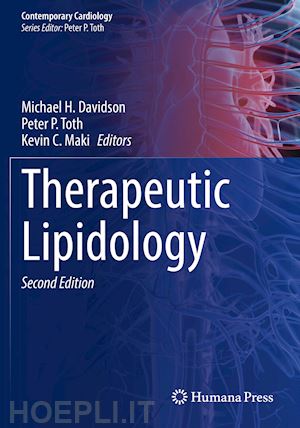
Questo prodotto usufruisce delle SPEDIZIONI GRATIS
selezionando l'opzione Corriere Veloce in fase di ordine.
Pagabile anche con Carta della cultura giovani e del merito, 18App Bonus Cultura e Carta del Docente
The second edition of this important book provides an up-to-date and comprehensive overview of clinical lipidology. Brand new chapters focus on recent advances in the field including novel biomarkers and the microbiome, genomics of cardiovascular risks, PCSK9 inhibitors, imaging technologies, and epidemiology of atherosclerotic cardiovascular disease.
The book describes new guidelines, novel therapeutic agents, and changes in the understanding of specific lipoproteins and subclasses with regard to their relationships to cardiovascular disease risk. The second edition contains more than thirty chapters covering such topics as the history of lipidology, lipoprotein metabolism and vascular biology, disorders of lipid metabolism, lifestyle/dietary and pharmacologic management for dyslipidemia, the management of dyslipidemia in certain subgroups (e.g., women, children, older patients) and lipid testing, as well as an examination of other biomarkers and testing procedures related toatherosclerosis and cardiovascular disease.
The second edition of Therapeutic Lipidology is an essential resource for physicians, medical students, residents, fellows, and allied health professionals in lipidology, cardiology, endocrinology, pharmacotherapy, and health promotion and disease prevention.
Chapter 1. History of Lipidology.- Chapter 2. Atherogenesis and Vascular Biology.- Chapter 3. Genetic Disorders of Lipoprotein Metabolism.- Chapter 4. Cardiovascular Genomics.- Chapter 5. Epidemiology of Atherosclerotic Cardiovascular Disease.- Chapter 6. Comparison of 2018 AHA-ACC Multi-Society Cholesterol Guidelines with 2013 ACC-AHA Cholesterol Guidelines.- Chapter 7. The Low-Density Lipoprotein Cholesterol Hypothesis: An Update.- Chapter 8. Triglyceride-rich Lipoprotein Cholesterol (Remnant Cholesterol) as a Therapeutic Target for Cardiovascular Disease Risk.- Chapter 9. Medical Nutrition Therapy for Lipid and Lipoprotein Disorders.- Chapter 10. Nutraceuticals and Lipid Management.- Chapter 11. Pharmacology of Statins.- Chapter 12. Management of Statin Intolerance.- Chapter 13. Intestinally Active Therapies for Hypercholesterolemia: Ezetimibe, Bile Acid Resins and Plant Sterols.- Chapter 14. Proprotein Convertase Subtilisin/Kexin Type 9: Functional Role in Lipid Metabolism and its Therapeutic Inhibition.- Chapter 15. Management of Hypertriglyceridemia (Including Fibrates and n-3 Fatty Acids).- Chapter 16. Pathophysiology and Management of Dyslipidemias Associated with Insulin-resistant States.- Chapter 17. Therapeutic Management of Obesity.- Chapter 18. High Density Lipoproteins.- Chapter 19. Lipoprotein (a): Principles from Bench to Bedside.- Chapter 20. Management of Homozygous Familial Hypercholesterolemia.- Chapter 21. Lysosomal Acid Lipase Deficiency.- Chapter 22. Lipodystrophies.- Chapter 23. HIV and Dyslipidemia.- Chapter 24. Cardiovascular Disease in Women: Focus on Lipid Management.- Chapter 25. Management of Dyslipidemia in the Elderly.- Chapter 26. Management of Dyslipidemia in Children.- Chapter 27. Lipoprotein Subfractions in Clinical Practice.- Chapter 28. Ion Mobility Lipoprotein Analysis.- Chapter 29. How ApoB Measurements Could Improve Prevention of Cardiovascular Disease.- Chapter 30. C-reactive Protein and Other Inflammatory Markers in Cardiovascular Disease; Inflammatory Disorders and Atherosclerosis.- Chapter 31. Coronary Artery Calcium and CT Angiography.- Chapter 32. The Clinical Use of Ultrasound for Atherosclerosis Imaging.- Chapter 33. Emerging Therapies for Regulating Dyslipidemias and Atherosclerosis.- Chapter 34. The Allied Health Professional’s Role in the Management of Dyslipidemia and Accreditation Council for Clinical Lipidology Certification Program.- Chapter 35. The American Board of Clinical Lipidology Physician Certification Program.











Il sito utilizza cookie ed altri strumenti di tracciamento che raccolgono informazioni dal dispositivo dell’utente. Oltre ai cookie tecnici ed analitici aggregati, strettamente necessari per il funzionamento di questo sito web, previo consenso dell’utente possono essere installati cookie di profilazione e marketing e cookie dei social media. Cliccando su “Accetto tutti i cookie” saranno attivate tutte le categorie di cookie. Per accettare solo deterninate categorie di cookie, cliccare invece su “Impostazioni cookie”. Chiudendo il banner o continuando a navigare saranno installati solo cookie tecnici. Per maggiori dettagli, consultare la Cookie Policy.